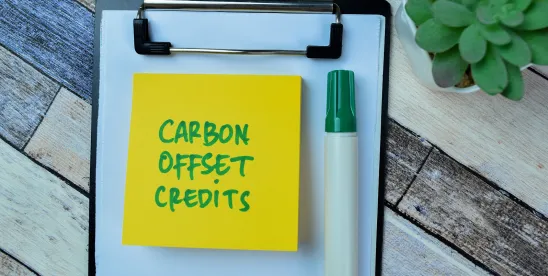On October 2, 2024, the Commodity Futures Trading Commission (CFTC), the U.S. Department of Justice (DOJ), and the Securities and Exchange Commission (SEC) announced[1] parallel prosecutions charging a carbon credit project developer and several of its former officers with fraud in connection with the issuance of voluntary carbon credits (VCCs) through a scheme to fraudulently inflate the number of VCCs issued for a number of the developer’s projects.
These first cases against VCC fraud signal both the government’s intent to go after suspected fraud in VCC markets and a willingness to show leniency toward companies that promptly self-report fraud, remediate the harm, and cooperate in the government’s investigation. The circumstances described in the cases will likely stimulate renewed attention by project developers, VCC certifiers and registries on the standards and methods for internal controls and due diligence in the issuance and qualification of VCCs for sale.
The CFTC issued two orders settling charges against CQC Impact Investors LLC (CQC)[2] and its former chief operating officer (COO), Jason Steele.[3] The CFTC also announced the filing of a complaint in the U.S. District for the Southern District of New York against CQC’s founder and former chief executive officer (CEO), Kenneth Newcombe.[4] The CFTC alleged the Washington, D.C.-based carbon credit project developer engaged in fraud and knowingly and intentionally, or recklessly, delivered false, misleading or inaccurate submissions to a VCC certifier in order to receive an inflated quantity of VCCs. The company agreed to pay a $1,000,000 civil penalty, and CQC and Steele agreed to cease-and-desist from further violations, both of which were substantially reduced sanctions as a reward for their cooperation.
The DOJ separately announced[5] parallel charges against Steele, Newcombe, and the former Head of CQC’s Carbon & Sustainability Accounting Team, Ridip Goswami, including a guilty plea by Steele and an indictment against Newcombe and Goswami charging conspiracy and wire fraud, commodities fraud, and securities fraud.[6] It was reported that Newcombe denied the charges and is dying of cancer.[7] The DOJ declined to prosecute CQC in light of its voluntary and timely disclosure of the misconduct. The SEC separately settled securities fraud charges against CQC for allegedly defrauding investors with respect to its past and future ability to profitably and sustainably originate carbon credits. The SEC imposed no civil penalty in consideration of the remedial acts CQC promptly undertook and the cooperation it afforded the SEC.[8]
These actions come on the heels of the CFTC announcing final guidance for the VCC derivatives contracts traded on CFTC-regulated designated contract markets (DCMs)[9] and should serve clear notice to those participating in VCC markets that the CFTC views VCCs as commodities in interstate commerce subject to its anti-manipulation and anti-fraud rules.
Facts and Allegations:
The various settlement orders, complaint, and indictment describe CQC as among the largest VCC project developers in the world, developing projects to earn carbon offset credits by installing energy-efficient products in sub-Saharan Africa, Asia, and Central America. From 2019 to around December 2023, CQC allegedly engaged in a scheme to report false and misleading data and other information concerning the subject projects’ performance and compliance with the purported methodologies and validation and verification processes relating to the quality and supply of the VCCs for certain of its project to at least one carbon credit registry based in the United States (the Carbon Credit Registry) and to third-party validation and verification bodies. The scheme reportedly involved senior personnel manipulating surveys of the products’ use and performance to report inflated emissions reductions from energy-efficient stoves. As a result of the scheme, the Carbon Credit Registry purportedly issued CQC millions of carbon offset credits to which it was not entitled, and CQC sold those credits to participants in VCC markets.
In addition to paying a civil monetary penalty of $1,000,000, CQC agreed to the imposition of a cease-and-desist order against future violations and to adhere to various remedial conditions, including canceling or retiring enough VCCs to rectify its violations. CQC also agreed to prepare within the next year a detailed report of:
- The cancellation or retirement of credits sufficient to address the violative conduct;
- A comprehensive review of training to ensure personnel are fully complying with relevant methodologies, including but not limited to the accurate collection and reporting of all relevant data;
- An implementation of a comprehensive system of testing to ensure that all data submitted to carbon registries and/or VCC validation and verification bodies is accurate and complete and that all policies, procedures, and employee practices comply with (a) all relevant methodologies and (b) the Commodities Exchange Act and CFTC Regulations.
Steele also agreed to cease and desist further violations and to cooperate with the government going forward.
Key Implications:
- CFTC regulatory continuum. The CFTC’s cases are a continuation from the June 2023 CFTC Whistleblower Alert, which invited tips and expressed the agency’s intent to prosecute fraud and market manipulation in carbon markets. They serve notice to exercise care when making representations in connection with the certification of carbon credits. While the allegations here appear egregious, they reinforce the importance of substantiating claimed environmental benefits with sound data.
- Broad reach of the federal statute. Just as the CFTC and SEC have committed substantial resources to prosecuting fraud in the unregulated cryptocurrency markets, these actions reflect each agency’s commitment to the same in the unregulated world of VCCs when suspicion of fraud arises. Accordingly, many entities not traditionally subject to CFTC jurisdiction now should understand and comply with the agency’s anti-fraud and anti-manipulation rules.
- The VCC market remains unregulated. These cases emphasize that project developers on the carbon market can nevertheless be liable for fraud and market manipulation in much the same way as any participant in a commodity market. The various registries and independent validating bodies have detailed criteria for project developers to fulfil in order to verify VCCs for certification and, ultimately, issuance. Supporting the criteria of these registries are quasi-regulatory bodies and leaders in best practice, including the Voluntary Carbon Market Initiative, the Integrity Council for the Voluntary Carbon Market and the International Emissions Trading Association. These bodies are playing a growing role in contributing to the governance of the voluntary carbon market. It is important to note that the CFTC is not enforcing the guidelines set out by these bodies; however, it is enforcing the prohibitions in its statute and regulations against fraud and false or recklessly misleading or inaccurate reporting to the registries and independent validating bodies.
- Internal controls. CQC’s undertaking in the CFTC order to file a report within a year, as described above, sets forth the central objectives for internal controls for validating the information supplied to VCC verification bodies.
- Liability for secondary actors. It bears emphasis, as reflected in the DOJ conspiracy charges against Newcombe, that liability may not be confined to primary violators. In addition to exposure to criminal conspiracy charges, secondary actors also could face exposure under the CFTC’s statute for aiding and abetting primary violators and control persons are separately subject to liability for activity under their control.
- Private claims. The CFTC orders and complaint do not allege fraud as to VCC purchasers, but the DOJ press release about its cases alleges that the CQC sold fraudulently obtained VCCs “to unsuspecting purchasers who thought they were purchasing [VCCs] that reflected emission reductions calculated in accordance with [the VCC issuer’s] methodology.” Government prosecutions of this kind can often spawn follow-on private claims for damages. Interestingly, however, because the CFTC has declared VCCs to be commodities and not commodity derivatives, there might not be a private right of action for violations of the Commodity Exchange Act itself because the statute generally limits those actions to schemes in connection with swaps and exchange-traded futures and options.
- The scope of exposure to civil claims for invalid VCCs. The CFTC’s enforcement powers, as well as private claims of harmed investors and VCC purchasers, potentially can reach beyond carbon market project developers to any party with culpable involvement in the issuance or sale of invalid VCCs. Conceptually, this could include, among others, VCC registries, validators, verifiers, and other market participants.
- Standards for and market price impacts from remediation. More information than that set forth in the order is needed to assess how CQC’s remediation to cancel or retire VCCs will be effectuated and whether or how it will affect the value and continued legal standing of the VCCs currently held by third parties. Needless to say, the impact of the cancellation of carbon credits on downstream purchasers conceivably could be significant. If so, this would be a reminder to parties of the importance of accounting for the risk of cancellation or retiring of VCCs when contracting for credits.
Conclusion:
Ultimately, the civil and criminal actions against Newcombe, CQC, and Steele represent a pivotal step in the regulation of VCC markets. By addressing allegations of fraud in VCC markets for the first time, they reinforce the regulatory commitment to maintaining market integrity through strong enforcement. These government actions, coupled with the publication of the CFTC’s recent guidance and the Biden Administration’s Joint Policy Statement and Principles for the VCC markets, signal a clear intention to enforce accountability and ensure oversight of dynamic VCC markets.
Bracewell provides clients strategic support and guidance as they navigate the changing landscape and challenges in VCC markets and other related issues.
[1] CFTC Charges Former CEO of Carbon Credit Project Developer with Fraud Involving Voluntary Carbon Credits, Release No. 8994-24 (Oct. 2, 2024); U.S. Attorney Announces Criminal Charges in Multi-Year Fraud Scheme In The Market For Carbon Credits, Release No. 24-308 (Oct. 2, 2024); and https://www.sec.gov/files/litigation/admin/2024/33-11315.pdf
[2] In the Matter of CQC Impact Investors LLC, CFTC Docket No. 24-37 (Sept. 30, 2024).
[3] In the Matter of Jason Steele, CFTC Docket No. 24-36 (Sept. 30, 2024).
[4] Commodity Futures Trading Commission v. Kenneth Newcombe, No. 1:24-cv-07477 (S.D.N.Y. Oct. 2, 2024) (hereinafter, “CFTC v. Newcombe”).
[5] U.S. Attorney Announces Criminal Charges in Multi-Year Fraud Scheme In The Market For Carbon Credits, Release No. 24-308 (Oct. 2, 2024).
[6] United States v. Kenneth Newcombe and Tridip Goswami, No. 24-cr-567 (S.D.N.Y. Oct. 2, 2024).
[7] Law360, “Former C-Quest Capital CEO Indicted for Carbon Credit Fraud” (October 2, 2024, 10:37 PM EDT).
[8] In the Matter of CQC Impact Investors LLC, File No. 3-22224 (Oct. 2, 2024) (alleging CQC “falsely represented [to institutional investors] material information about its carbon credit business, including erroneous historical results and unfounded financial projections”).
[9] Leslie M. Hansen, Nicholas Neuberger, Elizabeth L. McGinley, and Charles R. Mills, US Regulators Show Support for Roll Out of Voluntary Carbon Credits in Derivative Markets (Sept. 26, 2024), https://www.bracewell.com/resources/us-regulators-show-support-for-roll-out-of-voluntary-carbon-credits-in-derivative-markets/; see also CFTC Approves Final Guidance Regarding the Listing of Voluntary Carbon Credit Derivative Contracts, Release No. 8969-24 (Sept. 20, 2024).






 />i
/>i

